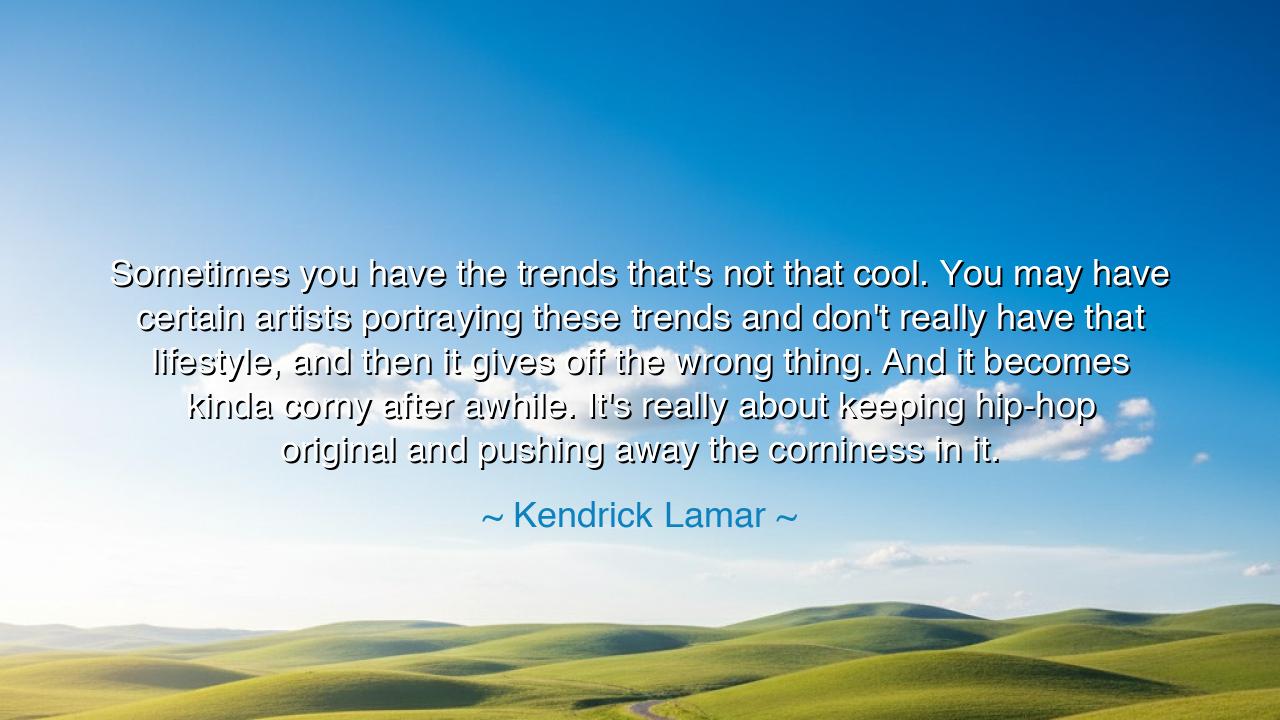
Sometimes you have the trends that's not that cool. You may have
Sometimes you have the trends that's not that cool. You may have certain artists portraying these trends and don't really have that lifestyle, and then it gives off the wrong thing. And it becomes kinda corny after awhile. It's really about keeping hip-hop original and pushing away the corniness in it.






When Kendrick Lamar spoke of trends, authenticity, and the dangers of corniness in hip-hop, he was tapping into an ancient and ever-present truth: that true artistry is grounded in authenticity, while the pursuit of fleeting trends often leads to a loss of soul. His words, “Sometimes you have the trends that's not that cool. You may have certain artists portraying these trends and don't really have that lifestyle, and then it gives off the wrong thing. And it becomes kinda corny after a while. It's really about keeping hip-hop original and pushing away the corniness in it,” remind us that the greatest art is not about mimicking the world around us but about expressing who we truly are. The struggle between true expression and the allure of trend-following is as old as time itself.
In the grand stories of the ancients, we see countless examples of those who strayed from their authentic paths and sought to adopt the trends of their time, only to face disgrace. The story of Narcissus, for instance, tells of a young man so enamored with his own image that he ignored his true self, leading to his destruction. This obsession with appearance over substance is echoed in Lamar's words—when artists or individuals chase what is popular, they risk losing their soul. Narcissism in art, and in life, is always a fleeting and hollow pursuit.
Consider the great philosopher Plato, who spoke of the importance of truth in art. In his Republic, he warned that the artist who simply mimics the world around him without reflecting the ideal truth is doing a disservice not just to himself, but to society. For Plato, art was not about imitating reality as it is, but about capturing its deeper essence. When artists, whether in the ancient world or today, adopt trends that are not authentic to their experience, they perpetuate a falsehood, and the art loses its power. Similarly, Lamar warns that when the hip-hop community follows trends that are inauthentic, the genre becomes tainted, losing the essence of what made it original and powerful.
Hip-hop, as Lamar suggests, is a genre that was birthed from the streets, from the authentic voices of those who had lived through struggle and resilience. It was never meant to be a platform for imitation or for following what was popular. The roots of hip-hop lie in truth, in the unfiltered stories of the oppressed, the marginalized, and the revolutionaries. Public Enemy, Nas, and Tupac—these are the voices that brought realness, not just rhythm, to the genre. They understood that hip-hop’s power lies in its truth—in its ability to speak directly to the soul of its audience. When the culture shifts toward trend-chasing, it loses that power.
Lamar’s declaration echoes the wisdom of the ancients who understood that trends may come and go, but authenticity is the foundation of timelessness. Think of Michelangelo, who, when commissioned to paint the Sistine Chapel, did not follow the fashionable styles of the time. Instead, he imbued his work with his own vision, his own truth, creating a masterpiece that transcended generations. In much the same way, Lamar calls for artists in hip-hop to create from their truth, to refuse to be swept up in trends that ultimately lead to emptiness. Corniness, in this context, refers not just to a lack of coolness, but to a lack of depth, a superficiality that undermines the very purpose of the art form.
The great lesson here is one that transcends hip-hop and speaks to the core of all artistic expression: create from your truth, not from the desire to conform. When you are driven by authenticity, your art will not just follow the currents of the moment, but will have the strength to influence the currents themselves. Authenticity is the very pulse of creativity; without it, we are left only with noise. Lamar’s words remind us that the value of art is not in its ability to follow the latest trends, but in its ability to speak deeply and meaningfully to the human experience.
So, what can we learn from Kendrick Lamar's message? The lesson is clear: stay true to yourself. Whether in music, art, or life, do not succumb to the pressures of imitation. The world may pull you toward the fleeting allure of what's “cool,” but the true strength of your voice lies in its originality. Strive to create from your heart, and your work will be timeless. In hip-hop, as in all art, the message is just as important as the flow—perhaps even more so. Let us, then, push away the corniness that seeks to distort the true essence of what we create, and embrace the power of authentic expression.






AAdministratorAdministrator
Welcome, honored guests. Please leave a comment, we will respond soon